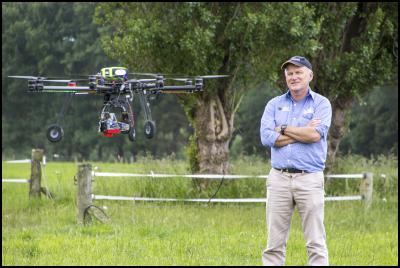Leading agri-tech researchers appointed top global role

World leading agri-tech researchers appointed top global role
September 25, 2016
Massey University’s Professor Ian Yule, one of the world’s leading agri-tech researchers, has been voted president of the International Society of Precision Agriculture for 2018-2020.
Professor Yule, a Precision Agriculture Association of New Zealand (PAANZ) committee member, will be a key speaker at the seventh Asian-Australasian conference on precision agriculture in Hamilton later next year. It will be the first time the conference has been held outside Asia.
Much of his research is centred around sensors and imaging to help expand New Zealand’s export agriculture and food production. He is looking to develop pasture measurement tools, aerial topdressing, irrigation, precision dairying, horticulture, viticulture and cropping.
He has a PhD in agricultural engineering and has a passion for remote and hyperspectral sensing, as well as finding practical, usable solutions to problems within the agriculture space.
His agriculture technology studies include a $10 million portfolio of research activity. His global-first research is at the forefront of developing practical applications for remote sensing and imaging that has worked towards New Zealand’s largest jointly funded remote sensing project. The research is expected to result in $120 million a year in export earnings by 2030 and net economic benefits of $734 million between 2020 and 2050.
“Here at Massey we have a state-of-the-art aerial imaging tool which was first developed for military reconnaissance and space exploration that can enable New Zealand to capture unprecedented levels of data about the nutrient content of large sections of land that may have been previously inaccessible.
“This is a game changer. It’s like turning the whole of New Zealand into a living lab, where you can observe exactly what is going on and describe it in greater detail than ever before.
“It will make New Zealand agriculture more efficient, profitable and environmentally friendly. It is a really cost-effective way to tell if there are weeds or diseases present.
“This is an extremely versatile and powerful technology. Which can be used in plantation forestry, exotic and native forestry as well as semi-urban and urban environments. There is also huge potential for orchard-based industries, like kiwifruit growers who could identify things like vine-killing disease, way before the human-eye could detect it.
“New Zealand has been a world leader in the development of pasture measurement for the past 10 years and our research provides is applying technology to increase production and farm profitability while improving environmental management in the hill country.
“I want to make sure the environmental impact of what we do is minimised as much as possible. The world needs more food, but we can’t produce it at the expense of the environment. By reducing waste and making much more efficient use of fertiliser, I think we can reduce our impact.”
Professor Yule was a finalist for the Researcher Entrepreneur Award at the 2014 KiwiNet Awards.


 Oji Fibre Solutions: OjiFS Proposes To Discontinue Paper Production At Kinleith Mill
Oji Fibre Solutions: OjiFS Proposes To Discontinue Paper Production At Kinleith Mill Hugh Grant: Navigating Digital Adoption In New Zealand - Embracing Change For A Bright Future
Hugh Grant: Navigating Digital Adoption In New Zealand - Embracing Change For A Bright Future Dawn Aerospace: Historic Flight - Breaks Sound Barrier And Global Records
Dawn Aerospace: Historic Flight - Breaks Sound Barrier And Global Records SEEK: SEEK NZ Employment Report - October
SEEK: SEEK NZ Employment Report - October University of Auckland: Protecting Young Minds With AI
University of Auckland: Protecting Young Minds With AI Greenpeace: Greenpeace Calls On Fonterra Investors To Consider Big Picture With Giant Puzzle
Greenpeace: Greenpeace Calls On Fonterra Investors To Consider Big Picture With Giant Puzzle



